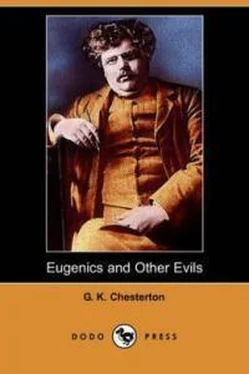It is better to be in a bad prison than in a good one. From the standpoint of the prisoner this is not at all a paradox; if only because in a bad prison he is more likely to escape. But apart from that, a man was in many ways better off in the old dirty and corrupt prison, where he could bribe turnkeys to bring him drink and meet fellow–prisoners to drink with. Now that is exactly the difference between the present system and the proposed system. Nobody worth talking about respects the present system. Capitalism is a corrupt prison. That is the best that can be said for Capitalism. But it is something to be said for it; for a man is a little freer in that corrupt prison than he would be in a complete prison. As a man can find one jailer more lax than another, so he could find one employer more kind than another; he has at least a choice of tyrants. In the other case he finds the same tyrant at every turn. Mr. Shaw and other rational Socialists have agreed that the State would be in practice government by a small group. Any independent man who disliked that group would find his foe waiting for him at the end of every road.
It may be said of Socialism, therefore, very briefly, that its friends recommended it as increasing equality, while its foes resisted it as decreasing liberty. On the one hand it was said that the State could provide homes and meals for all; on the other it was answered that this could only be done by State officials who would inspect houses and regulate meals. The compromise eventually made was one of the most interesting and even curious cases in history. It was decided to do everything that had ever been denounced in Socialism, and nothing that had ever been desired in it. Since it was supposed to gain equality at the sacrifice of liberty, we proceeded to prove that it was possible to sacrifice liberty without gaining equality. Indeed, there was not the faintest attempt to gain equality, least of all economic equality. But there was a very spirited and vigorous effort to eliminate liberty, by means of an entirely new crop of crude regulations and interferences. But it was not the Socialist State regulating those whom it fed, like children or even like convicts. It was the Capitalist State raiding those whom it had trampled and deserted in every sort of den, like outlaws or broken men. It occurred to the wiser sociologists that, after all, it would be easy to proceed more promptly to the main business of bullying men, without having gone through the laborious preliminary business of supporting them. After all, it was easy to inspect the house without having helped to build it; it was even possible, with luck, to inspect the house in time to prevent it being built. All that is described in the documents of the Housing Problem; for the people of this age loved problems and hated solutions. It was easy to restrict the diet without providing the dinner. All that can be found in the documents of what is called Temperance Reform.
In short, people decided that it was impossible to achieve any of the good of Socialism, but they comforted themselves by achieving all the bad. All that official discipline, about which the Socialists themselves were in doubt or at least on the defensive, was taken over bodily by the Capitalists. They have now added all the bureaucratic tyrannies of a Socialist state to the old plutocratic tyrannies of a Capitalist State. For the vital point is that it did not in the smallest degree diminish the inequalities of a Capitalist State. It simply destroyed such individual liberties as remained among its victims. It did not enable any man to build a better house; it only limited the houses he might live in—or how he might manage to live there; forbidding him to keep pigs or poultry or to sell beer or cider. It did not even add anything to a man's wages; it only took away something from a man's wages and locked it up, whether he liked it or not, in a sort of money–box which was regarded as a medicine–chest. It does not send food into the house to feed the children; it only sends an inspector into the house to punish the parents for having no food to feed them. It does not see that they have got a fire; it only punishes them for not having a fireguard. It does not even occur to it to provide the fireguard.
Now this anomalous situation will probably ultimately evolve into the Servile State of Mr. Belloc's thesis. The poor will sink into slavery; it might as correctly be said that the poor will rise into slavery. That is to say, sooner or later, it is very probable that the rich will take over the philanthropic as well as the tyrannic side of the bargain; and will feed men like slaves as well as hunting them like outlaws. But for the purpose of my own argument it is not necessary to carry the process so far as this, or indeed any farther than it has already gone. The purely negative stage of interference, at which we have stuck for the present, is in itself quite favourable to all these eugenical experiments. The capitalist whose half–conscious thought and course of action I have simplified into a story in the preceding chapters, finds this insufficient solution quite sufficient for his purposes. What he has felt for a long time is that he must check or improve the reckless and random breeding of the submerged race, which is at once outstripping his requirements and failing to fulfil his needs. Now the anomalous situation has already accustomed him to stopping things. The first interferences with sex need only be negative; and there are already negative interferences without number. So that the study of this stage of Socialism brings us to the same conclusion as that of the ideal of liberty as formally professed by Liberalism. The ideal of liberty is lost, and the ideal of Socialism is changed, till it is a mere excuse for the oppression of the poor.
The first movements for intervention in the deepest domestic concerns of the poor all had this note of negative interference. Official papers were sent round to the mothers in poor streets; papers in which a total stranger asked these respectable women questions which a man would be killed for asking, in the class of what were called gentlemen or in the countries of what were called free men. They were questions supposed to refer to the conditions of maternity; but the point is here that the reformers did not begin by building up those economic or material conditions. They did not attempt to pay money or establish property to create those conditions. They never give anything—except orders. Another form of the intervention, and one already mentioned, is the kidnapping of children upon the most fantastic excuses of sham psychology. Some people established an apparatus of tests and trick questions; which might make an amusing game of riddles for the family fireside, but seems an insufficient reason for mutilating and dismembering the family. Others became interested in the hopeless moral condition of children born in the economic condition which they did not attempt to improve. They were great on the fact that crime was a disease; and carried on their criminological studies so successfully as to open the reformatory for little boys who played truant; there was no reformatory for reformers. I need not pause to explain that crime is not a disease. It is criminology that is a disease.
Finally one thing may be added which is at least clear. Whether or no the organisation of industry will issue positively in a eugenical reconstruction of the family, it has already issued negatively, as in the negations already noted, in a partial destruction of it. It took the form of a propaganda of popular divorce, calculated at least to accustom the masses to a new notion of the shifting and re–grouping of families. I do not discuss the question of divorce here, as I have done elsewhere, in its intrinsic character; I merely note it as one of these negative reforms which have been substituted for positive economic equality. It was preached with a weird hilarity, as if the suicide of love were something not only humane but happy. But it need not be explained, and certainly it need not be denied, that the harassed poor of a diseased industrialism were indeed maintaining marriage under every disadvantage, and often found individual relief in divorce. Industrialism does produce many unhappy marriages, for the same reason that it produces so many unhappy men. But all the reforms were directed to rescuing the industrialism rather than the happiness. Poor couples were to be divorced because they were already divided. Through all this modern muddle there runs the curious principle of sacrificing the ancient uses of things because they do not fit in with the modern abuses. When the tares are found in the wheat, the greatest promptitude and practicality is always shown in burning the wheat and gathering the tares into the barn. And since the serpent coiled about the chalice had dropped his poison in the wine of Cana, analysts were instantly active in the effort to preserve the poison and to pour away the wine.
Читать дальше








